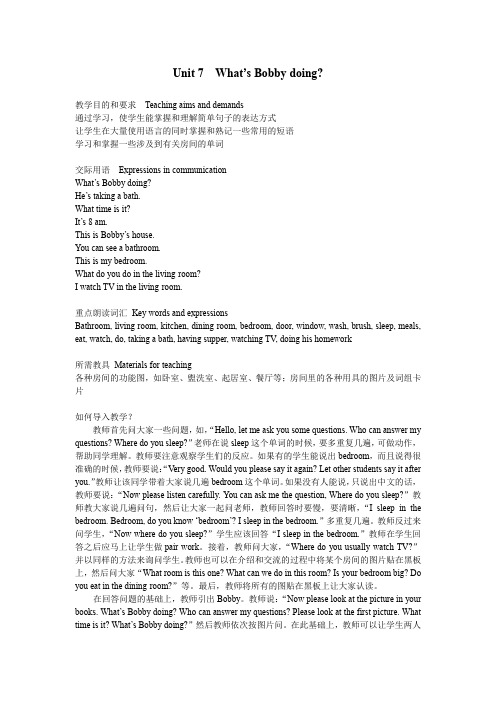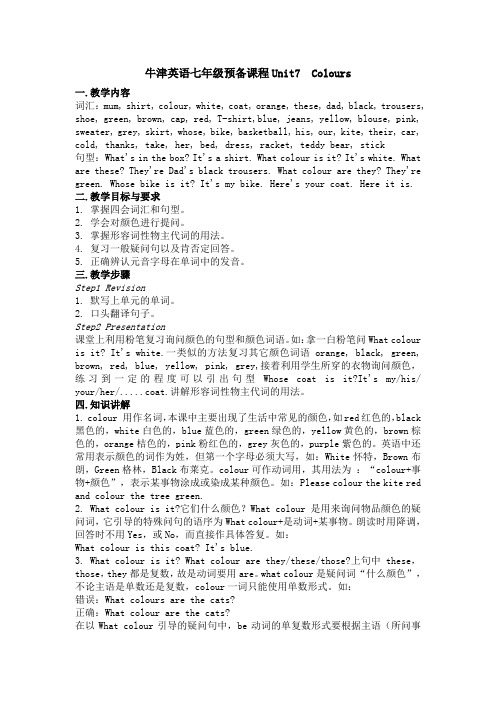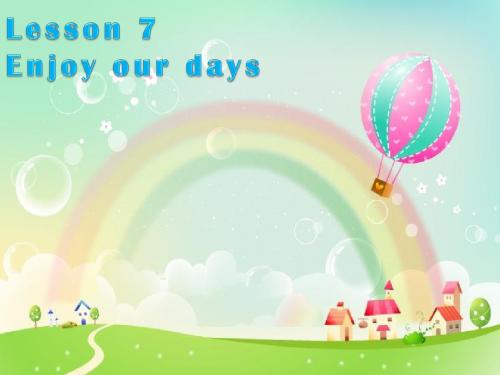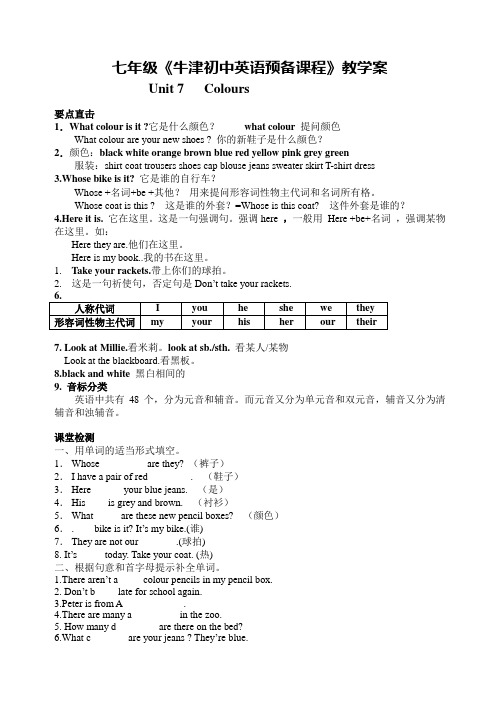新预备教材Unit7
- 格式:ppt
- 大小:1.49 MB
- 文档页数:53

Unit 7 What’s Bobby doing?教学目的和要求Teaching aims and demands通过学习,使学生能掌握和理解简单句子的表达方式让学生在大量使用语言的同时掌握和熟记一些常用的短语学习和掌握一些涉及到有关房间的单词交际用语Expressions in communicationWhat’s Bobby doing?He’s taking a bath.What time is it?It’s 8 am.This is Bobby’s house.You can see a bathroom.This is my bedroom.What do you do in the living-room?I watch TV in the living-room.重点朗读词汇Key words and expressionsBathroom, living room, kitchen, dining-room, bedroom, door, window, wash, brush, sleep, meals, eat, watch, do, taking a bath, having supper, watching TV, doing his homework所需教具Materials for teaching各种房间的功能图,如卧室、盥洗室、起居室、餐厅等;房间里的各种用具的图片及词组卡片如何导入教学?教师首先问大家一些问题,如,“Hello, let me ask you some questions. Who can answer my questions? Where do you sleep?”老师在说sleep这个单词的时候,要多重复几遍,可做动作,帮助同学理解。
教师要注意观察学生们的反应。
如果有的学生能说出bedroom,而且说得很准确的时候,教师要说:“V ery good. Would you please say it again? Let other students say it after you.”教师让该同学带着大家说几遍bedroom这个单词。

牛津英语七年级预备课程Unit7 Colours一.教学内容词汇:mum, shirt, colour, white, coat, orange, these, dad, black, trousers, shoe, green, brown, cap, red, T-shirt,blue, jeans, yellow, blouse, pink, sweater, grey, skirt, whose, bike, basketball, his, our, kite, their, car, cold, thanks, take, her, bed, dress, racket, teddy bear, stick句型:What's in the box? It's a shirt. What colour is it? It's white. What are these? They're Dad's black trousers. What colour are they? They're green. Whose bike is it? It's my bike. Here's your coat. Here it is.二.教学目标与要求1. 掌握四会词汇和句型。
2. 学会对颜色进行提问。
3. 掌握形容词性物主代词的用法。
4. 复习一般疑问句以及肯否定回答。
5. 正确辨认元音字母在单词中的发音。
三.教学步骤Step1 Revision1. 默写上单元的单词。
2. 口头翻译句子。
Step2 Presentation课堂上利用粉笔复习询问颜色的句型和颜色词语。
如:拿一白粉笔问What colour is it? It's white.一类似的方法复习其它颜色词语orange, black, green, brown, red, blue, yellow, pink, grey,接着利用学生所穿的衣物询问颜色,练习到一定的程度可以引出句型Whose coat is it?It's my/his/ your/her/.....coat.讲解形容词性物主代词的用法。

牛津英语七年级预备课程Unit7 Colours一、教学内容词汇:mum, shirt, colour, white, coat, orange, these, dad, black, trousers, shoe, gre en, brown, cap, red, T-shirt,blue, jeans, yellow, blouse, pink, sweater, grey, skirt, whose, bike, basketball, his, our, kite, their, car, cold, thanks, take, her, bed, d ress, racket, teddy bear, stick句型:What's in the box? It's a shirt. What colour is it? It's white. What are these? They're Dad's black trousers. What colour are they? They're green. Whose bike is it? It's my bike. Here's your coat. Here it is.二、教学目标与要求1. 掌握四会单词和句型。
2. 学会对颜色进行提问。
3. 掌握形容词性物主代词的用法。
4. 复习一般疑问句以及肯否定回答。
5. 正确辨认元音字母在单词中的发音。
三、教学步骤Step1 Revision1. 默写上单元的单词。
2. 口头翻译句子。
Step2 Presentation课堂上利用粉笔复习询问颜色的句型和颜色词语。
如:拿一白粉笔问What c olour is it? It's white.一类似的方法复习其它颜色词语orange, black, green, brown, red, blue, yellow, pink, grey,接着利用学生所穿的衣物询问颜色,练习到一定的程度可以引出句型Whose coat is it?It's my/his/ your/her/.....coat.讲解形容词性物主代词的用法。

创新大学英语预备级Unit7讲义Unit 7 HobbiesPart One Listening ComprehensionTask I Listening practice--listen to the word.1.Guide Ss to read the six phonetic symbols: /??/, /e?/, /u?/, /i/, /?/, /u/2.Let Ss take turns to read one group of words respectively, and correct the pronunciation if necessary. (10')3.Write down the vowels on the blackboard, and let Ss read after the teacher. (3')4.Listen to the tape and tick the word you hear. (5')5.Play the recording once again and check the answers one by one.(5')Task I Listening practice--listen to the conversations.1.Guide Ss to read the choice items so as to get known something of the conversation. (3')2.Play it once again and let Ss repeat it sentence by sentence. The teacher repeat and explain some difficulty points to make Ss know the contents of the conversation.(5')3.Play the tape once again sentence by sentence, trigger Ss to repeat the sentences so as to get the exact meaning of the conversations. (3')prefer...to...与...相比,更喜欢...would rather ... than... 宁可...而不......is no better (comparative form) than... 和...一样差much more adj. ...得多like nothing better than... 最喜欢...Task II Topic-related listening1.Let Ss listen to the tape of two conversations and do theexercises.(8')2.Check their answers without correcting their wrong answers. (12')3.Listen to the tape once again and then check their answers one more times to see if they can understand the conversations better.(5')4.Guide Ss to compare the choices so as to focus their attention on certain part of the recording and then listen to the long conversations. Repeat the sentences when necessary. (6')5.Check the answers and explain the difficult parts. Play the recording of the passage once again. (5')Part Two ReadingLeading-in1. Do you have hobbies? What are they?Probable answers:Playing basketball, singing, reading, go camping, go hiking, listening to the music…2. Do you think it is necessary to cultivate a hobby? Why?Or what are the benefits of having a hobby?Probable answers:It can enrich our life./broaden the horizon./make acquaintances.It can be a escape from the real life.It can make me confident.It can keep a balance between study and play.It can keep healthy.Task I Reading Comprehension—Passage One1.Give Ss time to read the two passages and do the multiple choices.Tell Ss to actively read the passage and analyze the textorganization while reading.Try to guess what will be told in the following part will be interesting for you to read.2.Explain the difficult sentences.Task I Reading Comprehension—Passage Two1.Read through the passage and do the exercise. (15')Apply the tips the teacher just told them into the reading.2. Check the answers in the fast reading. (5')Task II Fast Reading—Hobbies from Childhood1.Tell Ss they are going to read an interesting story about hobbies.2.Ask Ss to finish the exercises on P.155.Remind them to make full use of the same words appearing in the passage and the questions and takea guess. And tell them nearly all the answers can be found in the passage.3.Give Ss time to read the passage and get prepared to tell the story in English.4.Guide Ss to recall the story together.Part Three Intensive ReadingLeading-in1. Starting Ss talking about their hobbies.2. Starting Ss thinking about the benefits of having a hobby.3. Familiarizing Ss with the topics in the text.New words and expressions1. Let Ss read the new words by themselves. While reading, try to get familiar with their meaning and usage. (8')2. Let Ss read after the teacher and guide Ss to remember the words. (15')Squeeze: to try to make sth. Fit into a space that is too small.This machine helps you to squeeze more juice out.He squeezed her arm.Squeeze sb. /sth. in: to manage to do sth. although you are very busy.Can you squeeze me in sometime today?I've a busy morning but I could squeeze you in at 10:00.Active—activateActivate: to make sth. active.We must activate the youth to study.These push buttons can activate the elevator.Enhance: to improve sth.This is an opportunity to enhance my reputation.It aims to enhance teachers' professionalism.Sharp—sharpenSharpen: to become stronger and/ or cleaner.She needs to sharpen up before next the competition.This exercise will help students sharpen up their reading skills.Be engaged in: to be doing or to become involved in an activity.They are engaged in talks with the government.He is engaged in the organization of a new club.Restore: to make sth. return to its former state or condition.A good rest will restore you to health.Troops were sent to the islands to restore order.Absorbed in sb./sth. : very interested in sth./sb. so that you are not paying attention to anything else. He is absorbed in that math problem.They are absorbed in the experiment.Concentration--concentrateSolely: not involving anything or anyone else; only.He is solely responsible.We depend solely upon our voluntary helpers.Define: to explain the exact qualities, limits, duties, etc.Please listen while I define your duties.The powers of a judge are defined by law.Anxiety--anxiousAnxiety: the feeling of being very worried about sth.Her voice was full of anxiety.Her sick child is a great anxiety to her.Depress—depressed—depressing--depressionDepression: a feeling that makes you think there is no hope for the future.She suffered from depression after losing her job.The trip to the seashore brought her out of her depression.Rely on: to trust or depend on sb./sth. to do what you need or expect them to do.You can always rely on T om, he won't fail you.We can rely on our children to do such work.Foster: to help a skill, feeling, idea, etc. develop over a period of time.It is very important to foster an interest.The mother tried to foster her son's interest in music.Fulfill: to do or provide what is necessary or needed.If you make a promise you should fulfill it.The workers are making efforts to fulfill this year's plan.Perform—performanceBe inclined to do sth. : to be likely to do sth. or behave in a particular way. She was inclined to trust him.I am not inclined to move out of the house.Adequate—inadequateReflect: to think carefully and deeply about sth. Reflect on/ uponI often reflect on my schooldays.I must reflect upon how to answer the question.Sure of oneself: confident in your own abilities and opinions.He is sure of himself.Energetic: having or needing a lot of energy or determination.The elderly man is quite energetic.Inspire: to give sb. the idea for sth. or to encourage sb.A good novel serves to educate and inspire people.Music can revive the body and inspire the soul.Lead to: to cause sth. to happen or cause sb. to do sth.An ordinary cold can soon lead to a fever.This suggestion will certainly lead to an argument.Approach to: a method of doing sth. or dealing with a problem.We must take a scientific approach to the problem.The approach to the house was a narrow path.As well as: in addition to sb./sth. else.The old people as well as the children like this film.She can play tennis as well as basketball.Guilt—guiltySchedule: to plan that sth. will happen at a particular time.He is scheduled to arrive at noon.Make sure: to do sth. so that you can be certain of the result.Make sure to turn off the light before you leave.I only came to make sure that everything was all right.Text—Hobbies Are Rich in Psychic Rewards1.Skim the text quickly and find out the main idea of the text, then finish the exercise for main idea.(5')2.Scan the text again and figure out the text organization, then finish the exercise for textorganization. (5')3.When Ss finish the Ex, check all the answers. (10')4.Explain the text in detail.(45')1) Be rich in: 在……很富足Hobbies are rich in psychic rewards.He is poor in money, but rich in knowledge.2)Be in a good/bad mood: be in high/low spirit, be happy/unhappyHe is clearly in a good mood today.He is in a bad mood because he is in love.3) Sharp sharpen:light lighten; worse worsen; wide widen; white whiten; deep deepen4) Prepare oneself sth/for sth:给自己准备.../让自己为...而准备Prepare yourself a notebook to write down the important points.Prepare yourself for the final-exam.5) Meet one's needs:满足……需要I will adjust my timetable to meet your need.We must meet the instant need of the people.6) Make time for sth: find time to do sthI think mothers should make time for their children.Can you make time for lunch?7)Far more: ……得多He is finding his new work far more exciting.Practice is far more important than book knowledge.8) Look before you leap: 三思而后行9) Any time/ every time/ the moment/ the first time/the next timePart Four Oral Practice1.Let Ss read the useful expressions and try to remember some that they are likely to use one day in the future. (15')2.Read the paragraph of Activity One to Ss, and explain some difficult sentence. (15')3.Ask Ss to check out the hobbies shown in each picture. (10')Fishing, hiking, reading, singing, chatting and swimming, dancing and play basketball.4.Ask some students one by one about the questions in Activity Three. (15')(1) What do you like doing in your spare time?(2) Do you think that hobbies will change as one grows up? Why or why not?5. Divide the class into 2-person group with the same amount of students, ask Ss to discuss the question of Activity Four. (15')Part Five Grammar—名词性从句1. Give Ss an overview of the usage of normative clause. (30')当主句(句子)的主语宾语或者表语成分不是一个词组(一般为名词词组)而是一个句子时,这个充当句子组成成分的部分就是我们说的名词性从句,可以分别称为主语从句,宾语从句,表语从句。


七年级《牛津初中英语预备课程》教学案Unit 7 Colours要点直击1.What colour is it ?它是什么颜色?what colour 提问颜色What colour are your new shoes ? 你的新鞋子是什么颜色?2.颜色:black white orange brown blue red yellow pink grey green服装:shirt coat trousers shoes cap blouse jeans sweater skirt T-shirt dress3.Whose bike is it? 它是谁的自行车?Whose +名词+be +其他?用来提问形容词性物主代词和名词所有格。
Whose coat is this ? 这是谁的外套?=Whose is this coat? 这件外套是谁的?4.Here it is. 它在这里。
这是一句强调句。
强调here ,一般用Here +be+名词,强调某物在这里。
如:Here they are.他们在这里。
Here is my book..我的书在这里。
1.Take your rackets.带上你们的球拍。
2.这是一句祈使句,否定句是Don’t take your rackets.7. Look at Millie.看米莉。
look at sb./sth. 看某人/某物Look at the blackboard.看黑板。
8.black and white 黑白相间的9.音标分类英语中共有48个,分为元音和辅音。
而元音又分为单元音和双元音,辅音又分为清辅音和浊辅音。
课堂检测一、用单词的适当形式填空。
1.Whose _________are they? (裤子)2.I have a pair of red ________. (鞋子)3.Here ______your blue jeans. (是)4.His ____is grey and brown. (衬衫)5.What _____are these new pencil boxes? (颜色)6..____bike is it? It’s my bike.(谁)7.They are not our _______.(球拍)8. It’s _____today. Take your coat. (热)二、根据句意和首字母提示补全单词。
创新大学英语-预备级教案Unit7Hobbies第一篇:创新大学英语-预备级教案Unit 7 HobbiesUnit 7 HobbiesInnovation College English(Pre-starter)Lecture 1 Part 1 Listening comprehensionObjective: To distinguish /iə/, /uə/, /eə/To identify comparisons and contrast.1.Guide Ss to remind some phrases of showing comparisons and contrast.(5')prefer...to...与...相比,更喜欢...would rather...than...宁可...而不......is no better(comparative form)than...和...一样差 much more adj....得多like nothing better than...最喜欢...2.Give Ss time to read the items and try to guess the content of the conversation or the missing word in the passage.(5')3.Play the record.(15')4.Guide students to notice the differences between these similar phonetic symbols and check the answers.Answer some of the students to read a group per person and try to correct their pronunciation.(5')5.Guide Ss to listen to the short conversations once again and repeat the key/difficult words or sentences.(5')6.Guide Ss to compare the choices so as to focus out attention on certain part of the recording and then listen to the long conversations.Repeat the sentences when necessary.(5')7.Check the answers and explain the difficult parts.Play the recording of the passage once again.(5')Part 2 Reading Comprehension Passage One 1.Let Ss recall if they can still remember the scene their parents red story to them before they went to sleep and how they felt the stories.And later tell Ss they are going to read a passage about a kid reading experience in her childhood.(2')Unit 7 HobbiesInnovation College English(Pre-starter)2.Ask Ss to read the text and finish the multiple choices.(8')3.Pick some interesting sentences to explain and let them know how to express that meaning in English.(2')Half buring myself underneath a blanket, reading with a flashlight.Be at the climax of the story, or right at the end.4.Guide Ss to translate the last paragraph, and choose one sentence to remember at class.(10')Passage Two1.Tell Ss some reading skills.That is to locate the theme statement of the passage and topic sentence of each paragraph.(5')2.Ask Ss to read the passage and try to figure out the theme sentence and topic sentences, which would be helpful for them to guess the following content.(5')3.Guide Ss to find the important sentences so as to get a clear picture of the text orgnization.(5')4.Check the answers.(5')Assignments1.Read passage 3 and find out all the hobbies of the author's and put them in a correct order according to the time.Besides, finish the following exercise.2.Preview the new words in the intensive reading.2 Unit 7 HobbiesInnovation College English(Pre-starter)Lecture 2Warming-upQuestions for discussion:(15')1.Do you have hobbies? What are they? 2.Do you think it is necessary to cultivate a hobby? Why? Or what are the benefits of having a hobby? Probable answers: 1.playing basketball, singing, reading, go camping, go hiking, listening to the music2.It can enrich our life./broaden the horizon./make acquaintances.It can be a escape from the real life.It can makeme confident.It can keep a balance between study and play.It can keep healthy.Study the Text in Detail1.Listen to the recording of the text and underline the difficult parts they can't understand.(8')2.Read the text loudly by themselves and try to find the answers to the questions in page 161.(17')3.Guide Ss to learn the new words.(10')Psychology, in a good mood, be absorbed in/ be engaged in/ be in the middle of/ be buried in, define/definition, rely on/depend on, foster/cultivate, lead to/ result in/ approach to doing sth, be guilty of, ahead of time/schedule, optional course, think twice before you leap nguage points(40')a.Hobbies are rich in psychic rewards.业余爱好:丰厚的精神回馈 Be rich in: 在。